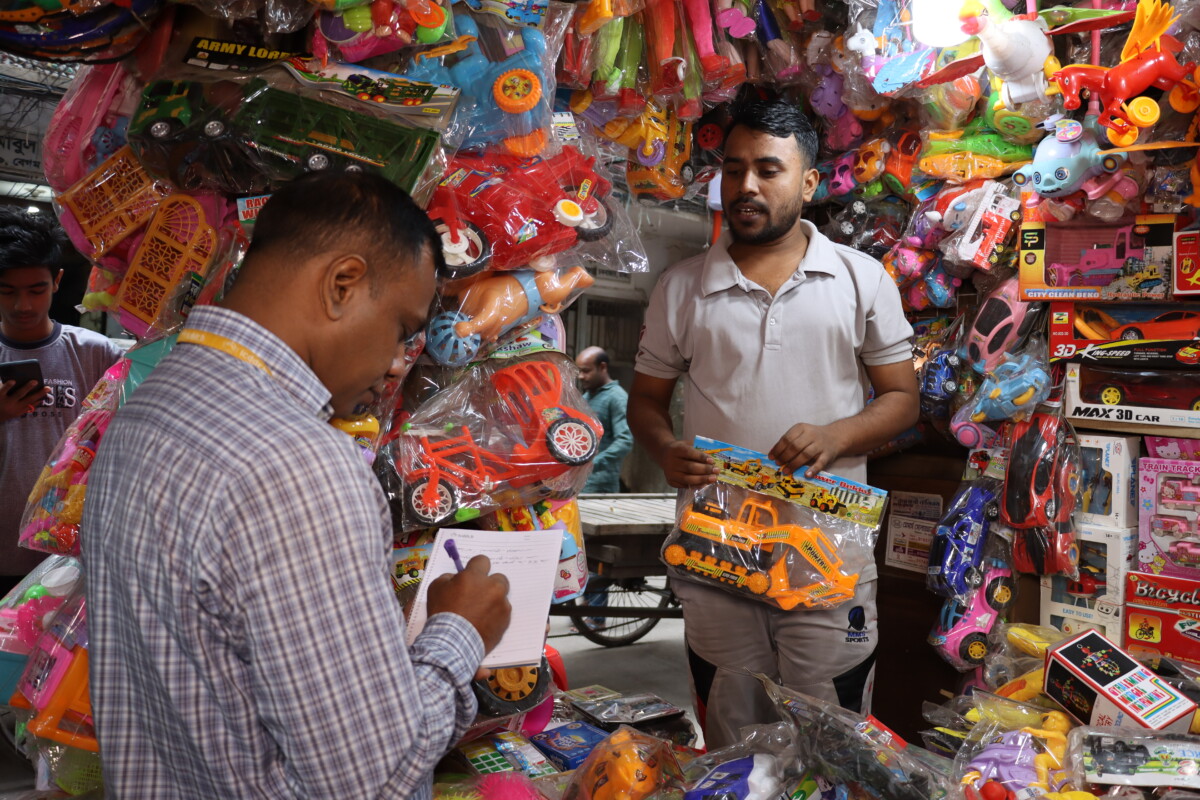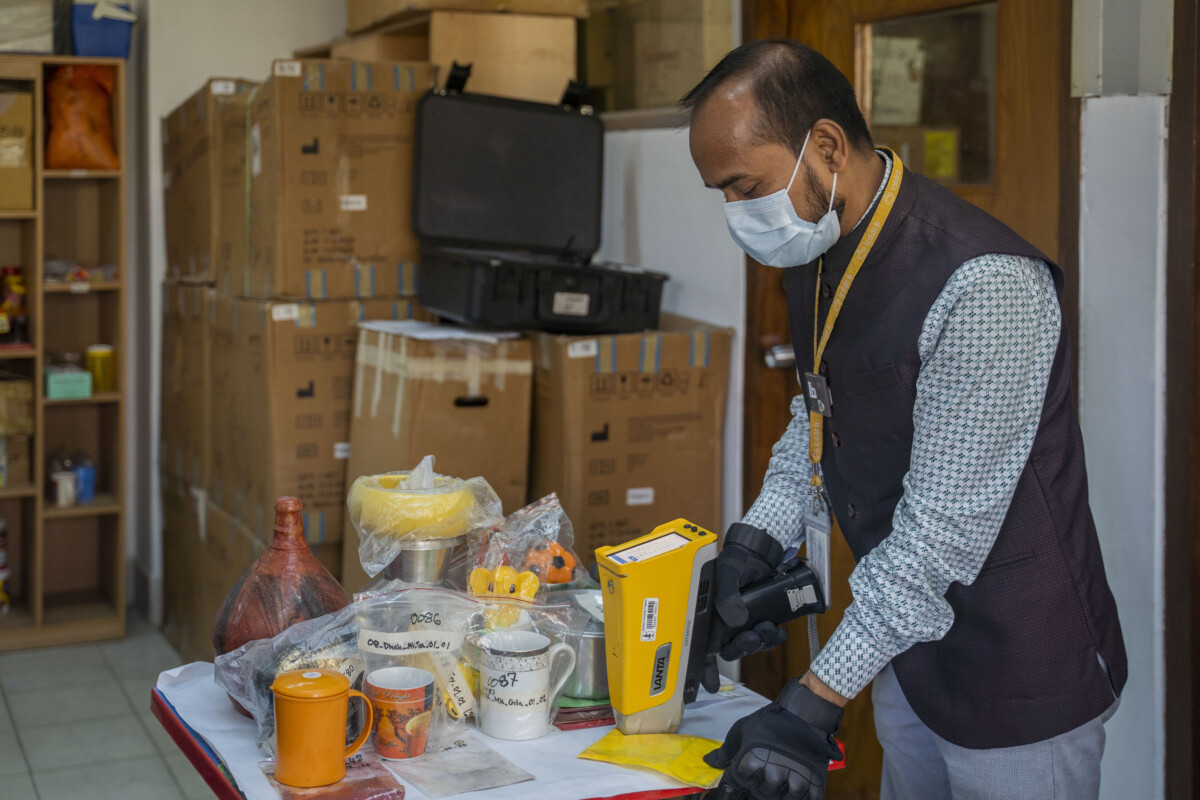Rapid Market Screening (RMS) Study in Bangladesh

Read the Summary Report of the Rapid Market Screening (RMS) Study in Bangladesh (Published on September 12, 2023)
 Lead contamination poses a widespread threat to households globally, with chronic exposures often linked to the use of lead-contaminated or adulterated products, such as spices and cookware, influenced by local customs. Recognizing this urgent challenge, Pure Earth secured grants from key philanthropic entities including Open Philanthropy, the Effective Altruism Global Health and Development Fund, and GiveWell in July 2021 to address lead exposure in low- and middle-income countries.
Lead contamination poses a widespread threat to households globally, with chronic exposures often linked to the use of lead-contaminated or adulterated products, such as spices and cookware, influenced by local customs. Recognizing this urgent challenge, Pure Earth secured grants from key philanthropic entities including Open Philanthropy, the Effective Altruism Global Health and Development Fund, and GiveWell in July 2021 to address lead exposure in low- and middle-income countries.
Pure Earth’s Rapid Market Screening (RMS) program is aimed at gaining crucial insights into the consumer products and foods contributing to lead poisoning in these regions. Spanning from 2021 to 2023, researchers meticulously analyzed lead concentrations in thousands of products and foods sourced from markets across 25 countries, including Bangladesh.
The overarching objectives are threefold:
- Identify primary sources of lead exposure in low- and middle-income countries.
- Implement targeted interventions to mitigate lead exposure from the most significant sources.
- Conduct baseline and endline analyses of blood lead levels to quantify the impact of interventions.
In Bangladesh, the RMS project’s intervention began with a comprehensive desk review, gathering crucial demographic data and pinpointing potential sources of lead. This meticulous review informed the protocol for market screenings, drawing insights from published literature on local lead (Pb) sources. Such a systematic approach guided the initial sampling and analysis of products, commodities, and substances with the potential for lead contamination within the country.
The identified potential sources from the Desk Review Report (DRR) were:
- Spices
- Ceramics/pottery
- Cookware from recycled aluminium
- Medicines
- Cosmetics
- Sweets
- Toys
- Paints
- Other foods and non-food items
 Expanding upon the insights gleaned from the Desk Review Report (DRR), the investigative officers in Bangladesh embarked on formative research (FR) endeavors. This involved screening specific markets and procuring products for portable X-ray Fluorescence (XRF) testing to ascertain their lead content. The whole process was conducted following a pre-developed technical study protocol. The initial FR screening in the capital Dhaka served as a precursor to a more extensive and systematic sampling and testing effort conducted across districts.
Expanding upon the insights gleaned from the Desk Review Report (DRR), the investigative officers in Bangladesh embarked on formative research (FR) endeavors. This involved screening specific markets and procuring products for portable X-ray Fluorescence (XRF) testing to ascertain their lead content. The whole process was conducted following a pre-developed technical study protocol. The initial FR screening in the capital Dhaka served as a precursor to a more extensive and systematic sampling and testing effort conducted across districts.
 The formative research phase of the Rapid Market Screening (RMS) study unfolded in Dhaka city in December 2021. The investigation team meticulously visited eight wholesale markets within Dhaka City, namely: Mirpur Co-operative Market, Mirpur Shah Ali Market, Mohammadpur, Town Hall Market, Mirpur Capital Tower Market, Mohakhali Kacha Bazar, Mohakhali Bazar, Mohakhali Shattola Bazar, and Chowk Bazaar. A total of 163 samples spanning 11 types of items were collected during these visits, revealing lead presence in 40 samples across 9 categories of items.
The formative research phase of the Rapid Market Screening (RMS) study unfolded in Dhaka city in December 2021. The investigation team meticulously visited eight wholesale markets within Dhaka City, namely: Mirpur Co-operative Market, Mirpur Shah Ali Market, Mohammadpur, Town Hall Market, Mirpur Capital Tower Market, Mohakhali Kacha Bazar, Mohakhali Bazar, Mohakhali Shattola Bazar, and Chowk Bazaar. A total of 163 samples spanning 11 types of items were collected during these visits, revealing lead presence in 40 samples across 9 categories of items.
Noteworthy findings in the Dhaka RMS study included alarmingly high lead levels detected in certain products: deep yellow pigment (153,000 PPM), amulet (252,000 PPM), plastic orange-colored mug (3,387 PPM), and aluminum spatula (2,054 PPM).
 Taking insights from the formative research, Pure Earth Bangladesh began the second phase of the RMS study in July 2022 in three districts: Khulna, Rajshahi, and Barishal. The investigative officers visited a total of six wholesale markets they were: Kulna – Boro Bazar, Prantik Market, New Market; Rajshahi – Shaheb Bazar, New Market; and Barishal – Shagordi Market, New Market. A total of 197 samples of 11 types of products such as aluminum, ceramic, steel, melamine, and plastic foodware, aluminum cookware, toys, cosmetics, paint – unclassified, craft/art, spices, and rice/starch were collected and analyzed. The samples were purchased and tested off-site with a ThermoFisher NITON hand-held portable X-ray fluorescence – XRF Heavy Metal Analyzer (Olympus Vanta Model). The number and type of samples analyzed from Khulna, Rajshahi, and Barishal districts were:
Taking insights from the formative research, Pure Earth Bangladesh began the second phase of the RMS study in July 2022 in three districts: Khulna, Rajshahi, and Barishal. The investigative officers visited a total of six wholesale markets they were: Kulna – Boro Bazar, Prantik Market, New Market; Rajshahi – Shaheb Bazar, New Market; and Barishal – Shagordi Market, New Market. A total of 197 samples of 11 types of products such as aluminum, ceramic, steel, melamine, and plastic foodware, aluminum cookware, toys, cosmetics, paint – unclassified, craft/art, spices, and rice/starch were collected and analyzed. The samples were purchased and tested off-site with a ThermoFisher NITON hand-held portable X-ray fluorescence – XRF Heavy Metal Analyzer (Olympus Vanta Model). The number and type of samples analyzed from Khulna, Rajshahi, and Barishal districts were:
- Metallic foodware: 27 samples
- Ceramic foodware: 09 samples
- Plastic foodware: 11 samples
- Paints: 30 samples
- Rice/Starch: 12 samples
- Toys: 30 samples
- Spices: 46 samples
- Cosmetics: 32 samples
A total of 55 samples which is about 24% of samples contained lead levels above the threshold level whereas metallic foodware, ceramic foodware, and paint contained the highest levels of lead.
See the brief RMS study report here.
The percentages of some of the major samples that exceeded the relevant reference level:
- Metallic foodware (59%)
- Ceramic foodware (44%)
- Paint – Unclassified (54%)
- Paint – arts/craft (50%) *results from 5 or fewer samples
- Rice/Starch (17%), and
- Toys (13%)

Read the full report of the Rapid Marketplace Screening (RMS) study
Know more about the insights from 25 countries where 5000+ samples were analyzed through RMS study: RMS Study Insights
Recommendations to Mitigate Lead Pollution:
- Blood Lead Level Testing: Conduct regular blood lead level testing in low- and middle-income countries to gain better insight into lead poisoning prevalence, aiding resource allocation and progress tracking. Establish a blood lead monitoring process nationally, and integrate blood lead data into the MOHFW’s existing routine health information system
- Home-Based Source Assessments: Combine blood lead level surveys with in-home source analyses to identify connections between contaminated products and lead poisoning incidents in children, pinpointing local sources of contamination.
- Source Analysis at the National Level: The Government should take the initiative to conduct nationwide lead source analysis to understand the magnitude of the problem and plan interventions
- Research on Foodware Leachability: Investigate the safety of metal and ceramic foodware by assessing leachability, especially in settings like schools and hospitals where children are exposed. Replace contaminated cookware where necessary.
- Establish Limits for Total Lead in Foodware: Set maximum allowable concentrations for total lead in foodware at the lowest achievable level, ensuring product safety, and preventing lead leaching into food. Also, many consumer and food products do not have reference values/standards for using lead in the products. Need to standardize the use of lead.
- Reduce Leachability in Metallic Foodware: Research methods to reduce lead leachability in metal pots, potentially through additives or coatings.
- Enforce Lead Paint Laws: Implement and enforce regulations limiting lead in paint, following national regulations. Bangladesh already has limited lead in paint to 90 PPM, yet enforcement of such laws is not enforced by regulatory authorities.
- Replicate Spice Adulteration Programs: Expand successful efforts to combat lead-based pigment adulteration in spices from Bangladesh and Georgia to other regions
- Enforce laws and regulations to prevent lead-based chemical use in consumer products including spices, aluminum cookware, and ceramic foodware.
- Further research: Conduct more research to confirm sources – Agricultural fields, chemical fertilizers, culture fish, and fish feed. Explore the exposure route of lead contamination through qualitative investigation
- Building Capacity of Government: The research evidence suggests to urgent need to build the Health System’s capacity to fight against lead poisoning
- A national multi-sectoral strategy and action plan is needed to address lead poisoning in Bangladesh.
- Collaborate with the private sector to prevent the usage of leaded paint in toys, and leaded glaze in aluminum and ceramic cookware and foodware
- Raise awareness: Public awareness and education are crucial to prevent the sources of lead exposure, collaborating with vendors and producers’ associations is imperative to bring social and behavioral change and transforming the knowledge into practice-level
